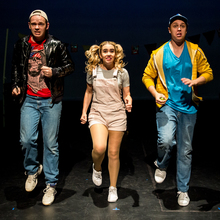Deadset Theatre & Nicholas Clark on Adapting the Page for the Stage
We speak to two companies adapting Australian young adult fiction into Fringe shows
Nicholas Clark has been a fan of author Paul Jennings for some time. "Long ago I toured schools with a stage adaptation of some of Jennings’ short stories, and the kids absolutely loved his work," he says.
When he had the opportunity to work with a theatrical company that was dedicated to developing new Australian work, Clark secured the rights to The Gizmo, a novel where a teenager is peer pressured into a theft from a market stall.
"It was then a matter of actually finding the right person to do the stage adaptation," he recalls. "I approached Verity Laughton, and she jumped at the opportunity. She knew Paul’s writing, she knew he was very theatrical, and she knew the challenge of adapting his work would be something that would excite her. The big thing that she brought in was the role of a female character into the work. The original story is actually quite male-dominated, but we wanted to avoid having people think this is just a show for boys."

Nicholas Clark Management: The Gizmo
The Gizmo isn't the only literary adaptation on the Adelaide stage. Deadset Theatre Company bring Kathy Lette's Puberty Blues to Stirling Theatre. As Deadset's Zoe Muller and Matilda Butler tell us: "The play is set in seventies Australia, and it follows the lives of two teenage girls, Debbie and Sue, as they endeavour to become part of the popular Greenhills Gang. It’s about their issues with sex, drugs, alcohol – teen issues that are still as relevant today as they were in the seventies."
When she first read the novel, Muller didn’t think its themes still resonated. "But as I started to grow older I realised that all the themes are still relevant today – that’s what gripped me, that a story that’s set a generation ago can still be just as important to teenagers now."
Muller and Butler both think authenticity is key to the success of the original work. "It was written by teenagers, for teenagers, in such a realistic way. You don’t often get stories like that."
They extended the philosophy to their adaptation. "It does help that the cast is all aged between 16 and 21, so it is teenagers being teenagers, which is what makes this production as awesome as it is."
 Floods of Fire with Electric Fields & the ASO
Floods of Fire with Electric Fields & the ASO
 Review: Time Machine
Review: Time Machine
 Review: Antigone in the Amazon
Review: Antigone in the Amazon
 Review: I Hide in Bathrooms
Review: I Hide in Bathrooms